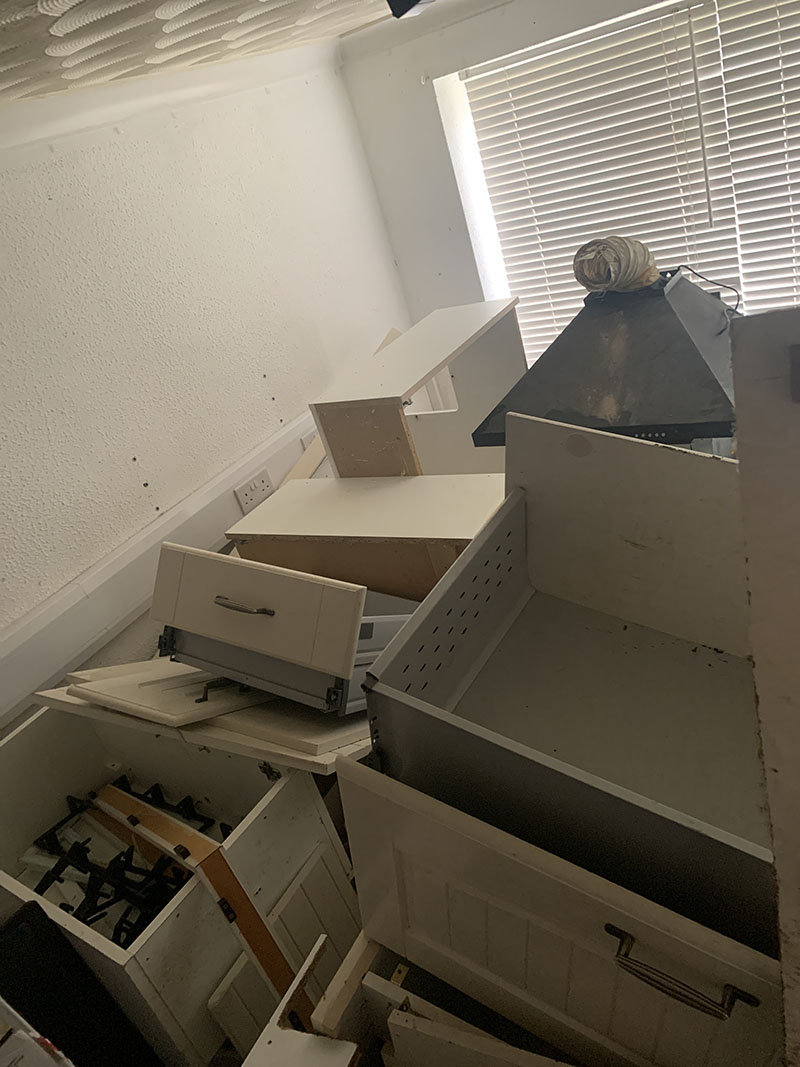Kitchen Cabinet Removal & Disposal: Comprehensive Guide
 Edited by Ali Lijee
Edited by Ali Lijee
Rubbish.com has licensed waste carriers providing kitchen cabinet removal and disposal services in towns and cities across the UK. Get rid of unwanted units from your kitchen at affordable prices with the man & van rubbish removal partners listed here on our site.
We dismantle, remove and dispose of kitchen units
Table of contents:
- Best kitchen removal & disposal service UK
- Kitchen removal service near you
- Gallery of kitchen units we have removed
- Kitchen removal & disposal: questions people commonly ask
Best kitchen removal & disposal service UK
Whether you’re remodelling your kitchen or you simply need white goods such as fridge freezers, dishwashers, or washing machines removing, the hardworking man & van rubbish removal partners can help dispose of everything but including the kitchen sink!
Our member partners can help dismantle, collect, and dispose of cabinets and cupboards, countertops, sinks and faucets, cooking appliances and white goods, extractor range hoods, light fixtures, flooring, wall tiles and backsplashes, kitchen décor and accessories, small domestic appliances, cookware and crockery, dishes, kitchen linens, and much more.
Kitchen removal service near you
Kitchens are functional rooms that can also offer comfort and enjoyment, but they should always be hygienic and reasonably clean since it’s where food is prepared and often served. Cluttered kitchens or old, mouldy cabinets or cupboards can be made squeaky clean with affordable rubbish removal services from Rubbish.com.
Looking for rubbish removal costs in the UK? Enquire with one of our member partners and request a no-obligation quote today.
Gallery of kitchen units we have removed
Kitchen removal & disposal: questions people commonly ask
Can you remove a kitchen yourself?
You can remove your kitchen yourself provided you have the skills and tools needed to do so. Removing a kitchen yourself can be far more affordable than hiring a contractor, but it can take much longer and you may encounter tasks that will require a professional such as hiring a Gas Safe engineer to disconnect a gas cooker, for example.
Do I need permission to move my kitchen?
You do not generally need planning permission to move your kitchen so long as all works are internal and no exterior works are required, e.g. installing a window or building the kitchen as an extension or loft conversion project.
Although you may not require planning permission to move your kitchen, you will likely require professional contractors to ensure that your newly built kitchen is compliant with building regulations.
How much does it cost to remove and refit a kitchen?
The cost of removing and refitting a kitchen in the UK can vary from around £6,000 to £17,000 for a typical kitchen, including materials and labour. Labour costs alone are typically around £1,500 whereas materials are highly variable.
Larger, more luxurious kitchens with premium-quality materials can cost far more, perhaps up to £100,000 for high-end kitchens.
How do you remove old kitchen cabinets in the UK?
Most kitchen cabinets in the UK can be removed in four steps:
- Remove all contents from the cabinets and remove the doors by unscrewing the hinge screws.
- Unscrew any screws holding cabinets to one another. Modern modular cabinets are typically screwed to one another whereas older cabinets may be single units that cannot be unscrewed.
- Dismount the cabinets from the wall by removing any screws or by cutting any sealant/caulking glued to the wall with a utility knife.
- Pull the cabinet away from the wall and set it aside for disposal.
Can I give my old kitchen to charity?
Homeowners across the UK can donate old kitchen rubbish to charities such as cabinets, cupboards, furniture, crockery, and white goods such as refrigerators and dishwashers.
Depending on the condition of the kitchen rubbish and the charity, you may be able to dispose of unwanted old kitchen waste and rubbish for free through platforms such as Reuse Network, Freecycle, or another local charitable organisation.
Where do I start decluttering my kitchen?
The best way to de-clutter your kitchen is to make it work in your favour rather than having to do extra work whilst in the kitchen. In other words, try rearranging the contents of your kitchen in a way that complements your most frequent activities.
If you’re a frequent tea or coffee drinker, have a dedicated station for your morning or afternoon cuppa. If you only cook for yourself or your family, you may not need a complete dining set with dozens of plates and excessive cutlery.
Consider disposing of unused and excess kitchen clutter by donating it to charity, selling it online, or having it disposed of with a man & van rubbish removal team.
How much does kitchen removal cost?
The cost of kitchen removal from around £90-£260 for a typical half-vehicle load of kitchen waste such as cabinets and cupboards to around £220-£520 or more for a full vehicle load. The cost of kitchen removal is highly variable depending on the type of waste and rubbish, weight, and the amount of labour required.
The best way to find out kitchen removal costs in the UK is to obtain a free quote from a man & van rubbish removal company near you.
How long does it take to remove an old kitchen?
It should normally take around 1-2 days to refit an old kitchen in the UK. Depending on the complexity of the project and the amount of labour required, kitchen removal should not take longer than two full days for the average-sized kitchen.
How much does it cost to refit a small kitchen UK?
The cost of refitting a small kitchen in the UK will typically range from around £6,000 to £17,000, including materials and labour. Labour alone will normally cost around £1,500 whereas material costs can vary significantly depending on style and preference.
How many years should a kitchen last?
A kitchen can last anywhere from around 10-15 years to well over 50 years depending on the quality of workmanship, materials, and how well it is maintained.
Naturally, various elements of the kitchen will have different lifespans such as cookers, fridges, and cabinets, so it may be better to think of how long these kitchen elements last rather than the entire kitchen.
Can you remove kitchen cabinets without removing the countertop?
You can remove your kitchen cabinets without having to remove the countertop. To remove your cabinets without removing the countertop, unscrew the cabinets then create an opening near the plumbing so that they can be pulled out later. Prop up the countertop with wooden beams, then slide the cabinets out from the enclosure.
Is it possible to move a kitchen to another room in the UK?
It is possible to move a kitchen to another room, but it may cost significantly more than remodelling the kitchen in its existing location. Kitchen relocation typically requires qualified professionals due to the need to change electrical, gas, and plumbing connections to the new kitchen’s location. Modifications that require tearing down load-bearing walls may also require an engineer.
Are kitchen cabinets glued together?
Kitchen cabinets are often glued together. The two most common ways of securing kitchen cabinets are with glue or with screws, but some kitchen cabinets may use both.
To determine whether or not your kitchen cabinets are glued, simply look inside the cabinets for any signs of screws. If there are none, your cabinets are glued.
Can you sell your old kitchen?
You may be able to sell your old kitchen through online marketplaces such as Facebook Marketplace or Gumtree, selling it to a friend or neighbour, or donating it to charity.
Many individuals are interested in used kitchen cabinets and countertops if they are in reasonably good condition or can be refurbished since the cost of buying used tends to be far more affordable than buying new.
In what order should a kitchen be redone?
The process of kitchen remodelling varies in scope depending on the needs of the homeowner, but generally the full process of kitchen remodelling includes: installation of insulation and plasterboard, painting walls & ceiling, flooring, cabinets and countertops, sinks and faucets, light fixtures, tiles & backsplashes, installation of appliances.
Should I remove the wall between the kitchen and living room?
You may wish to remove the wall between your kitchen and living room to create a more appealing open space concept. Interior non-load-bearing walls can be demolished, but a professional contractor is recommended if you have electrical or plumbing connections in the walls.
How do I know if a wall is load-bearing?
There are many ways to determine if a wall is load-bearing. The first and most efficient way to determine which walls are load-bearing (and which aren’t) is to hire a building contractor, engineer, or professional carpenter.
Load-bearing walls can generally be identified by their support, not their framing, since both load-bearing and non load-bearing walls are framed in a similar fashion. Load-bearing walls often run along your home where the foundation lies, which can be seen in an exposed basement or from the attic.
Do I need planning permission to take an interior wall down to open up the kitchen and dining room?
Generally, taking down an interior non load-bearing wall between your kitchen and dining room does not require planning permission or building regulations approval from local authorities.
Internal alterations such as this do not typically need approval, however if in doubt you should contact an engineer to determine whether or not a wall is load-bearing.
How difficult is it to relocate a kitchen?
Relocating a kitchen can be a highly complex job, depending on whether you intend to carry out DIY kitchen remodelling or hiring a contractor. The amount of labour required to relocate a kitchen tends to be higher than if the kitchen were to be refitted in its existing location.
Furthermore, relocating a kitchen usually requires redoing the plumbing, gas, and electrical connections which requires qualified professionals.
How much does it cost to move a kitchen to another room in the UK?
The cost of moving a kitchen to another room in the UK generally ranges from around £14,000 to £17,000 for a small to medium-sized kitchen. Large kitchens or kitchens that require extensive labour to fit can cost £20,000 or more.

 GET QUOTES
GET QUOTES
